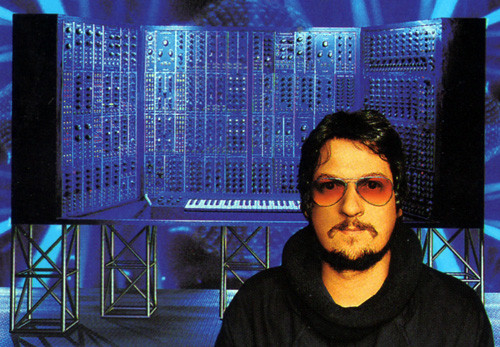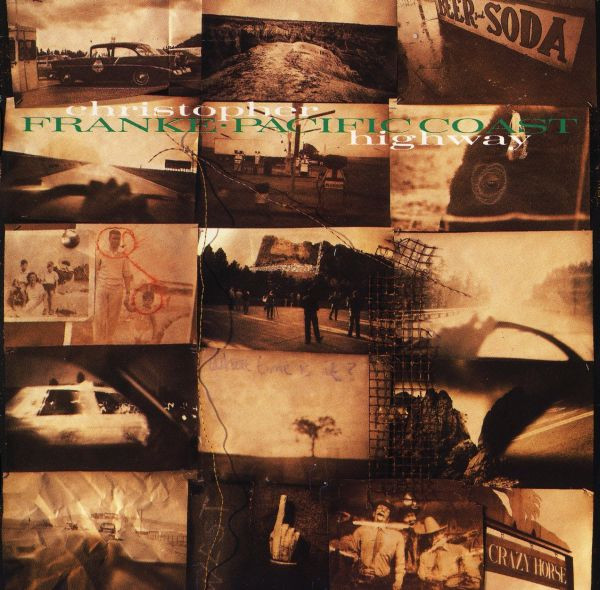In my last review, I explored the new collaborative release The Precious Dark by ambient master David Helpling and genre-defying composer Eric “the” Taylor. That album marked a perfect launch point for this series—something new, fresh, and emotionally rich.
👉 Read that review here
For this next entry, I’m shifting from the new to the timeless.
Because Pacific Coast Highway isn’t just a favorite album—it might be my favorite album. Period.
Discovery & First Impressions
I first became familiar with Christopher Franke through his work with the legendary Tangerine Dream, whose music has shaped much of my musical DNA. From the late ’70s into the ’80s, Franke’s contributions helped define an era of cinematic electronic sound.
So when he left Tangerine Dream and released Pacific Coast Highway in 1991, I was immediately intrigued—and completely blown away. The signature Franke sound was there, but refined, evolved. This wasn’t a departure; it was a graduation.
Most people might know him from his iconic score for the TV series Babylon 5, or from film soundtracks like Universal Soldier. But Pacific Coast Highway is something else entirely—personal, introspective, and emotionally resonant on a level that few albums ever achieve.
Track-by-Track Reflections
Listen along as you read.
This album is rare, so I’m grateful for this upload. Better yet, support the artist by purchasing it—links at the end.
There ARE some songs on his Anthology album Purple Waves (more on that later)
1. Black Garden View
This track feels like home. I’ve listened to it more times than I can count—literally thousands—and it still makes my heart flutter.
It opens the album like the first breath after waking. Gentle arpeggios, soft percussion, and tender flutes paint a serene sonic landscape. It’s nostalgic without being sorrowful, filled with emotional warmth.
Every year—on my birthday, on Thanksgiving, on Christmas—I start this song as I turn down the street where I grew up. It’s a ritual that connects my past to my present. This song is that emotional bridge.
2. Mountain Heights
Leaning more into a pop/rock structure, Mountain Heights still carries Franke’s atmospheric DNA. It’s rhythmically rich, with strong percussion and what sounds like a lead guitar—though it’s likely a synthesized tone.
Driving synth stabs and shimmering pads give it a sense of altitude, like ascending a mountain ridge at sunset. It’s more upbeat, but there’s still serenity woven through it.
It’s a track I sometimes skip—depending on mood—not because it’s weak, but because I’m often eager to reach Lontano Mystery. Still, Mountain Heights has a place in the pacing of the album.
3. Lontano Mystery
Here the mood shifts into something softer, more contemplative. This piece was also featured on Franke’s The Celestine Prophecy soundtrack, and it fits perfectly there.
Oboes glide through the soundscape, lending an ethereal, almost dreamlike texture. There’s a stillness here that invites inward reflection—a sonic pause to simply breathe.
4. Big Sur Romance
This is one of Franke’s most romantic pieces—starting with delicate echoes before blossoming into a gorgeous piano melody, with flutes dancing lightly behind.
This is a favorite of mine not just for its composition, but because of the running joke in my household. My wife often sings, “Flute! There’s a flute! You’re using flute again!” every time I write something similar.
She’s not wrong—I love the sound, and this track reminds me why.
5.Driving Into Blue
Momentum picks up here. Still mellow, but with more motion and drive. There’s a bright happiness in this song—flourishes, layers, and melodic counterpoints that feel like the sonic equivalent of sunlight on waves.
It evokes imagery of cruising down a coastal highway, top down, wind in your hair. It’s cinematic in the most joyous way.
6. Purple Waves
One of my all-time favorites from the album—and a track I’ve tried (and failed) to cover myself. Every version I’ve attempted just doesn’t feel like Purple Waves. It’s that personal.
The emotional resonance here is deep. I wasn’t in a great place through much of the ’90s, and this track was a sonic lifeline—something peaceful to hold onto.
If Black Garden View is the bridge between past and present, Purple Waves is the song that reminds me who I am.
7. Malibu Avenue
Light, breezy arpeggios and soft pads give way to an entrancing rhythm. There’s a quiet resilience to this track—like the sound of someone gently picking themselves back up after a hard day.
To me, it feels like a soundtrack to letting go—like running away from the noise and finding solace in solitude.
8. Cinnamon City Cliff
Cinematic, mysterious, and haunting—this one almost feels like a lost Tangerine Dream B-side. The use of oboe is prominent again (I can already hear my wife’s parody song in the background).
Plucked strings add a tension that reminds me of the Firestarter soundtrack. It’s a darker turn on the album’s emotional roller coaster.
9. Wheels On Beach Park
Another piece that dips into pop/rock territory, but with a lightness that’s pure joy.
It’s hard not to smile while listening. This is one of those “get out of a funk” songs. It lifts your spirits in subtle ways, layering upbeat motifs with just enough emotional depth to stay grounded.
And yes… flute.
10. Sunset Destination
A short, lovely track with a nylon guitar-like lead that instantly soothes. Just as you fall into its warmth, it fades out, leaving you wishing for more.
It’s like that last glimpse of sunlight before it slips beneath the horizon—brief, but unforgettable.
11.Crystal Tree
If I could distill myself into a single song—this might be it.
Whenever I’m anxious or uncertain, I put on Crystal Tree. It calms me. It returns me to innocence, to childhood, to the quiet moments holding my daughters when they were small.
Harp-like textures, bell tones, and gentle brass carry a lullaby-like grace. This track is soul-restoring in the truest sense.
I’ve told close friends, “If you want to know who I am—listen to this.”
12. Electric Becomes Eclectic
A fitting closer—minimal, introspective, and flute-forward. It reminds me of Sequent C from Tangerine Dream’s Phaedra, and it ties the whole album together in a single contemplative breath.
You don’t just end the album with this track. You reflect with it.
Final Thoughts
Pacific Coast Highway isn’t just one of my favorite albums. It’s a foundational album for me as a composer. You can hear its echoes throughout my own work—especially on darker cinematic pieces like Dawn, particularly Lilith’s Theme and Let Me Share What You Feel. Both of which are in my Aural Realms playlist below.
When I found a copy of this album on vinyl a few years ago, I practically wore it out. But honestly… I’ve been wearing it out since 1991
Listen / Purchase
About the Artists
Christopher Franke

Christopher Franke was born in Berlin, Germany, on April 6, 1953, and studied classical music and composition at the Berlin Conservatory. His early musical foundation in classical traditions eventually merged with a passion for electronic experimentation, leading him to join the pioneering group Tangerine Dream. From 1970 to 1987, Franke helped shape the band’s iconic sound, contributing to over three dozen albums and numerous acclaimed film soundtracks.
In 1987, seeking new creative horizons, Franke parted ways with Tangerine Dream to explore his own musical path. He founded the Berlin Symphonic Orchestra with a vision of blending orchestral, ethnic, and electronic elements—a signature fusion that would define his solo work. His debut solo album, Pacific Coast Highway, arrived in 1991, followed by The London Concert in 1992 and Enchanting Nature in 1994.
That same year, he released The Celestine Prophecy – A Musical Voyage, which became his most successful solo album and is often cited as one of the most innovative new age recordings of its time. He later collaborated with author Deepak Chopra on Transformation of Mind, a unique project combining Chopra’s poetry with Franke’s delicate, evocative compositions.
In addition to his success in the new age and ambient music scenes, Franke is widely recognized for his work in film and television—most notably for scoring the groundbreaking sci-fi series Babylon 5 and the film Tarzan and the Lost City.
